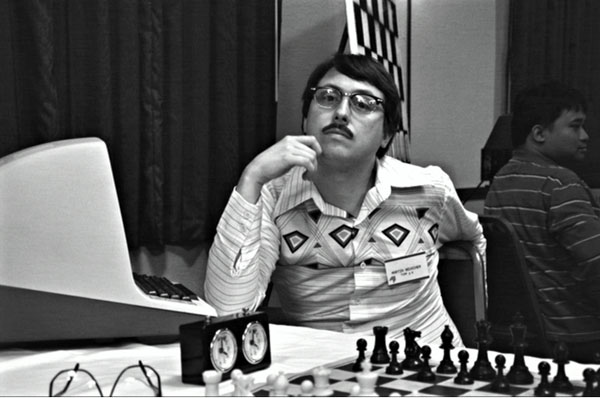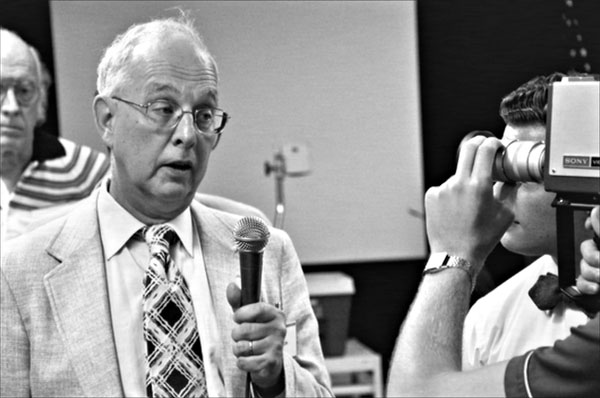At long last, Andrew Bujalski‘s latest hits theaters in the U.K., and we turn to Jason Wood at Electric Sheep to set it up for us one more time:
Computer Chess is set in and around an isolated roadside motel over the course of a 1980s weekend conference, where a group of obsessive software programmers have convened to pit their latest refinements in machine chess and the still-developing field of artificial intelligence against a somewhat circumspect chess master. One of the junior programmers attending the conference, a singularly unappetising banquet of cheap plaid suits, bad coffee and bland interiors, begins to suspect that the computer for which he is responsible has developed the ability to detect the difference between a human and an artificial opponent. The computer begins to display elements of self-consciousness, rather like a benign HAL from Kubrick’s 2001. Meanwhile, the junior programmer’s own attempts to engage with the sole female attendee at the conference, about whom a great deal of fuss is made, is punctured by social awkwardness and a preference for interaction with keyboards and motherboards over humans.
Roderick Heath at Ferdy on Films: “Its subject is, in part, the creation of a world the film is itself implicitly rejecting.” But Time Out‘s Tom Huddleston finds that “it’s near impossible to say exactly what it’s trying to be: a comic riff on obsession? A critique of our gadget-obsessed society? A romance? A sports drama? A science-fiction movie? A modern tragedy? How about all of the above, and more? Low key and occasionally frustrating it may be, but Computer Chess is a supremely intelligent, beautifully constructed film, interweaving comedy and character, satire and subtext, and loaded with more ideas than some filmmakers manage in a lifetime.”
“The movie looks and sounds, on purpose, as though its footage has been retrieved from a swamp,” notes the Telegraph‘s Tim Robey. “At first, you’d swear you were watching a documentary relying on murky scraps from the early Eighties…. Computer Chess will make you scratch your head and wonder what it’s up to—but there’s no doubt you’ll never have seen a film quite like it.”
“Many have seen this film as a brave new direction for Bujalski, a writer/director who honed his considerable skills by making emotionally intricate, Rohmer-esque studies of inadequacy and romantic disappointment such as Mutual Appreciation and Funny Ha Ha,” writes David Jenkins at Little White Lies. “They were movies in which, ostensibly, nothing happened, but were about the textures of dialogue, the mechanics of human interaction and the time people spend thinking about what they’re going to say. A film like Beeswax, about a young woman dealing with the precarious future of her vintage clothing store which she co-runs with an old friend-turned-enemy, supplants the gamesmanship and tactical prowess of chess into a real (and mundane) social situation. In fact, Computer Chess has less in common with the actual game of chess than Beeswax does.”
“The movie reminded me of Harmony Korine’s Trash Humpers in its bizarre retro-video fetishism, with something of Shane Carruth’s nightmare Primer,” suggests the Guardian‘s Peter Bradshaw. “The final seconds are superlatively freaky. Try it.”
More from Charlotte O’Sullivan (Evening Standard), Antonia Quirke (Financial Times), and the lone dissenter in this round, Adam Sweeting (Arts Desk).
For the Guardian, Ryan Gilbey‘s spoken with Bujalski and Joe Swanberg about whether there ever really was such a thing as “mumblecore.” Meantime, Cargo‘s posted four clips from its 2009 interview with Bujalski. In one of them, he explains why Beeswax is the last film of the Bush era.
Updates, 12/1: Anton Bitel for Sight & Sound: “The code for the future has already been written—and as Bujalski seeks to discover who we are and where we come from (not just as wired-in 21st-century users but as human beings), it’s checkmate in 12 hilariously unorthodox moves.”
“Odd, but in a good(ish) way,” finds the Observer‘s Mark Kermode.
For news and tips throughout the day every day, follow @KeyframeDaily on Twitter and/or the RSS feed. Get Keyframe Daily in your inbox by signing in at fandor.com/daily.





